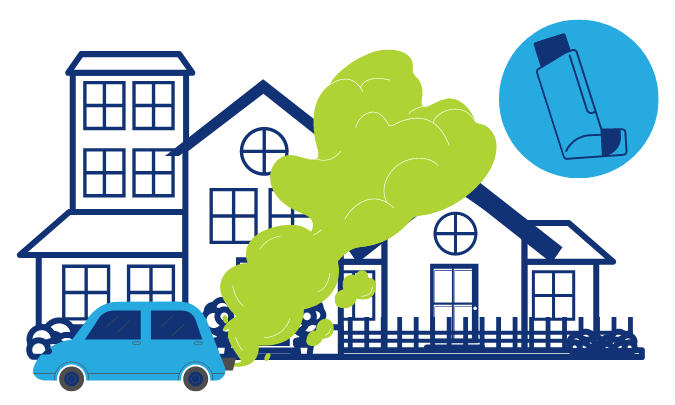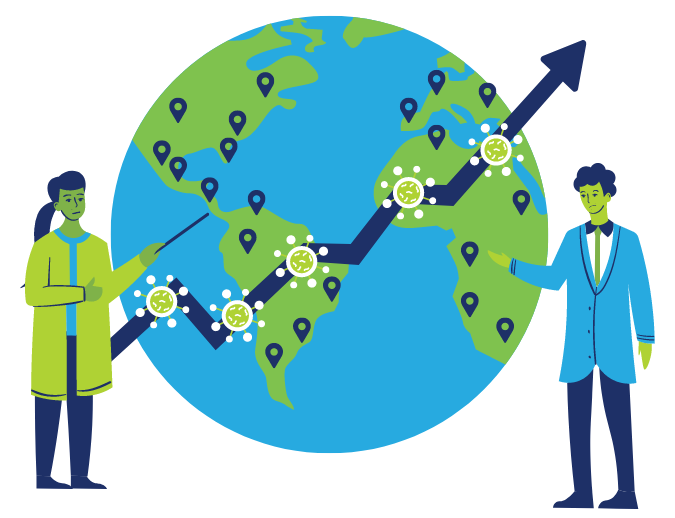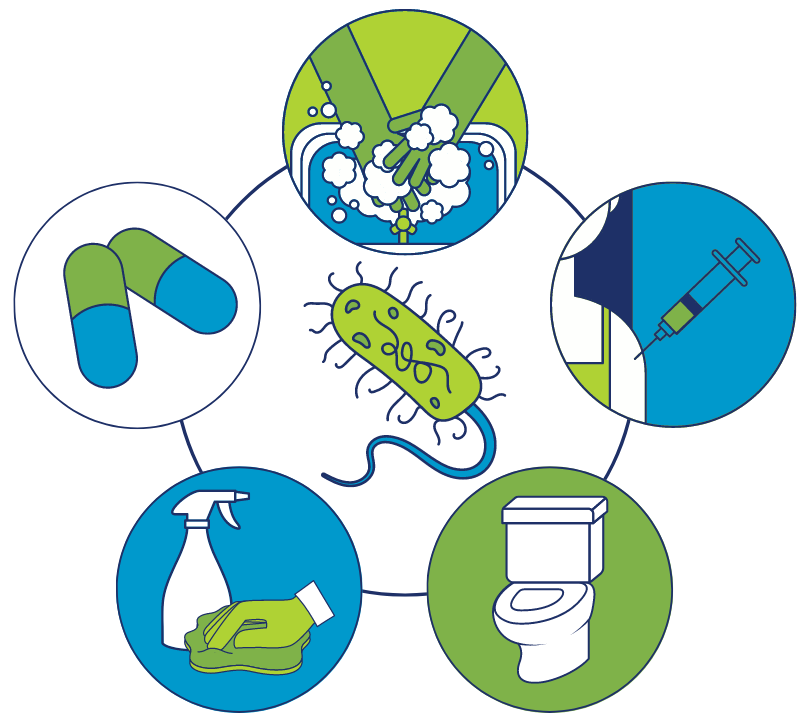
Infectious diseases are the second leading cause of death worldwide, killing tens of millions of people every year. COVID-19 alone has killed more than 6.8 million people, according to Johns Hopkins University. Drug-resistant superbugs directly kill 1.27 million people a year, according to one recent prominent study.
Surely drug companies are all over this potentially lucrative market, with so many diseases to fight and treat? However, they aren’t. The US Food and Drug Administration has not approved a new antibiotic since 2019, and only one truly new antibiotic has been approved since 1987.
It’s partly because the money just isn’t there. Companies making cancer drugs raised about $7 billion in funding in 2020, while companies making antibiotics raised a fraction of that – just $160 million. Plus, it’s hard to bring a new drug to market. The National Institutes of Health estimates 90% of experimental drugs never even make it to testing in humans.
In this episode, we are chatting with Professor Kevin Outterson, a professor of law at Boston University and the founding Executive Director and Principal Investigator of Combating Antibiotic-Resistant Bacteria Biopharmaceutical Accelerator or CARB-X, a global nonprofit partnership funded by the U.S., U.K., and German governments; Wellcome; and the Bill & Melinda Gates Foundation.
Professor Outterson argues that antibiotics should be treated as infrastructure, and companies making new drugs to fight antimicrobial-resistant bacteria, viruses, and fungi –often called superbugs – should be treated as vital government contractors and paid upfront for the work they do that could save tens of millions of lives. Listen as he describes the problem, and potential solutions, with One World, One Health host Maggie Fox.
Maggie Fox (0:01)
Hello and welcome to One World One Health, a place to talk about the planet and our problems. Climate, human health, and animal health are all connected, and the One Health approach recognizes how much all of us on this planet rely on one another. This podcast is brought to you by the One Health Trust, with bite-sized insights into ways to help.
If something’s alive, it’s evolving, and nothing evolves faster than microbes, such as bacteria, viruses, and fungi. They can all quickly change to resist the effects of antibiotics and other drugs used to fight them, something called antimicrobial resistance. These superbugs directly kill more than a million people a year. You might think drug companies are racing one another to bring new antimicrobials to market, but they aren’t.
In this episode, we’re chatting with Kevin Outterson, a professor of Law at Boston University, and the founding Executive Director and Principal Investigator of Combating Antibiotic Resistant Bacteria Biopharmaceutical Accelerator, or CARB-X, a global nonprofit partnership working to speed the development of new life-saving antimicrobials.
Kevin, thanks so much for joining us.
Kevin Outterson (1:16)
I’m glad to be here. Thanks for inviting me.
Maggie Fox (1:18)
So tell us just where we stand. Are drug companies pumping out all sorts of new antibiotics and antimicrobials?
Kevin Outterson (1:25)
The earlier you go in the research and development process, the more optimistic the story will be. If you look at the basic research labs, the universities and the early work being done by lots of the small companies in this space, amazing science, really interesting things. So the problem in my view isn’t predominantly…the bottleneck isn’t scientific, it’s really economic. Then the closer you get to the market, because of these economic difficulties, the more bankruptcies you see, the more companies that are struggling and getting out, the more dire the situation looks. So great science, especially early in the areas that we work at CARB-X, and the economics grind them into the ground when they get closer to reaching patients.
Maggie Fox (2:08)
Now, when you talk about economics, what do you mean? It just doesn’t pay to make these antibiotics?
Kevin Outterson (2:13)
You know, these are extremely valuable drugs to society. But what did you pay for your last antibiotic? I mean, typically, the copay at a Walmart is $4 for an antibiotic. They’re wonderful drugs that are largely very inexpensive. If a company spends 10 or 15 years bringing a brand new antibiotic to market, the first thing that the company wants to do is to sell it, to try to reimburse their investors. But for excellent reasons, all the doctors and the health systems want to keep that antibiotic on the shelf and save it for when we absolutely need it at some point in the future.
We have this situation in which the new antibiotics reach the market, they’re given a label from the World Health Organization as Reserve, hold them in Reserve. It’s wonderful for health and long-term global health, but it’s a disaster for the company. When they get FDA approval, it’s time for them to make money; instead, they watch their antibiotics not sell very much. And so we need to think about a different way to pay for antibiotics because they’re extraordinarily valuable to society. But that’s not been reflected in the way the R&D is being reimbursed.
Maggie Fox (3:20)
Okay, you’ve introduced a lot of ideas here and the idea of keeping a drug in reserve. Let’s go back a little bit and talk about why we need these new drugs and why some of them might be extra special and extra valuable.
Kevin Outterson (3:33)
Well, when you think about every drug class in human history, you know, anti-cancer drugs, or heart disease drugs, or pain drugs, or anything. Probably, the most impactful, the biggest bang on helping human health has been the antimicrobials, led by antibacterials, antibiotics: the most important thing in human history in terms of a drug class.
But unlike most drugs, like cancer drugs, aspirin, or heart disease drugs; these drugs, because of the biological factor of resistance, the fact that evolution causes the bacteria to develop traits that make the antibiotics less effective against them, these are the only drugs in which we need a sustainable, renewable strategy because the moment they’re invented, that’s the peak of their effectiveness, they begin to lose it immediately.
Aspirin was invented more than 100 years ago, it still works great on me, and hopefully on you too. But antibiotics, the best antibiotic we’ve seen, maybe in history, you need to recreate that in every generation, so the R&D challenges are uniquely different in this space.
Maggie Fox (4:35)
And that’s because these microbes quickly develop resistance the minute a drug hits a market. Sometimes some of the microbes are already resistant, right? They are already resistant microbes out there, the drug hits the market, and those are the microbes that then succeed.
Kevin Outterson (4:49)
Yeah, but it’s not instantaneous with bacteria. It’s a slower moving process. The bacterial genome is larger than a virus. So while we saw billions of cases of COVID and a relatively quick emergence of global varieties that may or may not be covered by the vaccines quite as perfectly as we hope, and every year, we get a different flu vaccine because the flu changes remarkably, your bacteria move more slowly.
But you’re right, it is without a doubt that the more you use it, the more resistance develops. And we want these drugs, these antibiotics, to last for 50 or 100 years, not five or 10 or 20 years. And so that means let’s take good care of them. We call that stewardship. Let’s use them only where necessary, let’s not waste them on agricultural uses for which they don’t help or in uses for people for which we don’t need them, [like] taking antibiotics when you have a virus. It doesn’t do you any good, it actually harms your microbiome, and it also accelerates resistance for the rest of us. So we need to protect them because eventually, they will go away. But my goal is, on the stewardship side, we put plans into place so that the next new antibiotic could last for 100 years. That’s a worthy goal.
Maggie Fox (6:01)
And so why can’t a company just develop one that will last longer? Why can’t they come up with the science to make them more flexible?
Kevin Outterson (6:08)
You’re asking a lot from a company that may only have 14 years left on its patent to create a drug that’s going to last 100 years. But there are almost no sales during those first 14 in which the company has the patent. How are they supposed to reimburse the investors for the several 100 million dollars’ worth of R&D that was put into it?
So we have to think about a different way to pay for these drugs. We call those delinked pull incentives. Things like subscription models that are coming out of the United Kingdom and some other G7 countries.
Maggie Fox (6:37)
Why can’t governments just either pay upfront or develop these drugs themselves so the companies don’t have to worry about losing money?
Kevin Outterson (6:44)
The subscription models are paid for by governments, and so the idea of push incentives like CARB-X, that I lead, or pull incentives, like a subscription model. These ultimately are paid for by governments, and especially the governments of the wealthier countries will contribute more.
But maybe your question was, why can’t the government just take over the entire function for antibiotic R&D? And to that, I’d say, I can’t name, at least in the US where I’m most familiar or in Europe, any research-intensive product that is entirely produced by the government without cooperation and partnership with private industry. And maybe you can, but even things that the government provides, like a bridge, they hire private companies to do the engineering and installation. Or the military, which is a very government [centric] function, the government doesn’t build the tank or missile themselves. They recognize the fact that they set the parameters and what’s needed, and then they put it out to bid to private companies who are able to actually execute more efficiently.
So I would like to hear about a research-intensive product that actually is produced entirely by a government and that we’re happy with the way that’s working. I think what’s more likely is public-private partnerships, with government and private industry and academia, public health stakeholders working together to get the sort of antibiotics we really need. Make sure that companies don’t get bankrupt, and make sure we have an adequate supply of these so that the 1.27 million people that The Lancet article tells us are dying each year from resistant bacterial infections, that these people actually have something that works for them, not just in the high-income countries, but everywhere in the world.
Maggie Fox (8:24)
And of course, that’s what you’re trying to do with CARB-X. Can you tell us a little bit about CARB-X?
Kevin Outterson (8:31)
CARB-X is nonprofit. We make grants. We also give the small companies that dominate the space a lot of technical, scientific, and business help, because usually, they’re quite small. They do what they do extraordinarily well if they have 10 or 15 people, but they need additional help. And they’re not getting it today from the rest of the ecosystem. So CARB-X has been awarded over 800 million US dollars since our founding in 2016. We spend that money to support the preclinical from hit to lead all the way to the end of Phase One, a pipeline for therapeutics prevention, including vaccines and diagnostics globally.
We’re funded by three governments, the US, the UK, and Germany, and two foundations, the Wellcome Trust and the Gates Foundation. And collectively, our vision is to ensure that highly innovative antibacterials, these products that are therapeutics, prevention or diagnostics, don’t die in that valley of death, that they actually get the money they need so that it can progress to the end of the Phase One trials.
Maggie Fox (9:32)
So you’re supporting this research and development early in the process. Tell us what the valley of death is.
Kevin Outterson (9:38)
We start at hit to lead, which is that the company has an idea, has some chemistry, a series of drugs that might work, a series of molecules really, and they’re testing it and beginning the early test in the petri dish to find out which one of the many in their lab actually work. It’s very early research. It’s frequently just out of universities. In a healthier market, like cancer, there’s lots of private investment in this preclinical and early clinical space when it begins testing in humans.
Maggie Fox (10:08)
And that’s because cancer drugs make a lot of money. Right?
Kevin Outterson (10:12)
Right, they make a lot of money. That drives not only lots of private investment in the preclinical space, there’s over 1000 cancer products in clinical trials in humans right now. So money does drive the R&D agenda.
Maggie Fox (10:26)
But for antibiotics? Not so much.
Kevin Outterson (10:28)
For antibiotics, there’s a real shortage of truly innovative products in the clinical pipeline, things that are being tested in people today. And WHO has looked at this and declared that it’s grim. And then in the earlier stages, we see lots of amazing science coming out of the universities, things that have been funded by national institutes like the NIH in the US, or their equivalents in many other countries. But these little companies that are spun out need some money to take it from the idea stage until it’s ready to actually be tested in a person. And that is the valley of death for antibacterials right now. There’s no private money to help those companies get over that hurdle. CARB-X is the largest funder in that space.
Where we start at the hit-to-lead stage, we’re about 12 or 13 years away from any sort of approval by the FDA. So we’re developing today supporting at CARB-X, things that are not for tomorrow but are for the next decade and decade after. If you want good drugs in the 2030s and 2040s, you’ll see these projects at CARB-X today. It just takes time.
Maggie Fox (11:36)
You’re a professor of law. Are there legal barriers that people might not think about in the effort to develop better antimicrobials?
Kevin Outterson (11:43)
The way I got into this field was, I was studying the way that intellectual property law, patents, etc, how they function well, and sometimes not so well in drug innovation more generally, and then became fascinated with how they are uniquely challenging when it comes to antibiotics. I don’t think there’s a problem with our patent system with antibiotics. But there’s clearly a problem in the way that we pay for antibiotics, how we reimburse for them. It’s not so much a straight-up legal barrier, but it’s changing the way we think about this.
One analogy is fire protection equipment. I’m sitting at Boston University right now and in the ceiling, there’s fire protection equipment. The people who built that were paid for that equipment decades ago, and the workers who installed it were paid on the day that they installed it. We’re not waiting until there’s a fire that breaks out to pay for the fire protection equipment in my office. We pay for it in advance so that we’re prepared.
For antibiotics, for the first decades and years of antibiotics, we paid for them only after the fire starts, when a patient is sick. And the amazing change that people are embracing is that we need to pay for antibiotics in a different way, thinking about them more as preparedness than response. That is the subscription model that the United Kingdom is pioneering. That is the bill in the United States, the Pasteur Act, and similar efforts in other G7 countries to change the way that we pay for antibiotics. I think that’s the most fundamental legal shift that has to happen.
We’re at a tipping point. Every week that goes by, I hear of another company that calls it quits. And some of these are public companies, and many of them are private, just little, affairs. I wonder how many highly trained antibacterial R&D people are left in the world. A lot of these people, like microbiologists, have skills that can transfer to other areas. There’s only so much of that getting paid that you can take before you need to pay the mortgage. And it’s understandable that this is not a lucrative field that doesn’t attract new talent.
This is a drug class that needs a sustainable plan. We can’t just do one and done for antibacterials. We have to think about how we’re going to do this for generations, and continue research efforts that sustain across our children and grandchildren, and great-grandchildren. Right? So we definitely need to think about this more like a piece of infrastructure. It’s the water pipes in Boston, or it’s a bridge across an important roadway or something because those assets we protect and plan and maintain. But antibiotics — nobody’s really protecting and maintaining it as an infrastructure asset and we should.
Maggie Fox (14:13)
So what can governments globally do? Can the global community help on this?
Kevin Outterson (14:19)
There are two big things that are happening. The first is that the G7, the seven wealthiest countries on Earth, have been working on this issue for some time. Germany headed the G7, they were the presidents last year. They specifically called out CARB-X and GARDP and Secure, a project at WHO, things that need to be supported in order to turn the tide against drug-resistant bacteria. That will continue this year with Japan being the leader and in May, there are several interesting things that Japan may be able to announce as they make progress on this issue.
The second is that the United Nations rarely holds high-level meetings on infectious diseases. And they’re going to have one on September 24 on antimicrobial resistance, which is a follow-through from an earlier meeting a couple of years ago. But it enables the governments of the world to each say, what are we doing ourselves? And what are we doing together to address this problem? So I’m very hopeful for concrete suggestions that follow with funding that have the support not just of the health ministries, but also the financial ministries, the people with money so that collectively we can do something useful against this problem.
Maggie Fox (15:28)
Kevin, thanks so much for joining us.
Kevin Outterson (15:31)
Thank you for having me.
Maggie Fox (15:35)
Listeners can share this podcast which is brought to you by the One Health Trust by email, LinkedIn, or your favorite social media platform.
And let us know what else you’d like to hear about at [email protected]. Thanks for listening.
Guest

Professor Kevin Outterson, J.D., LL.M. teaches health care law at Boston University, where he co-directs the Health Law Program. He serves as the founding Executive Director and Principal Investigator for CARB-X, an >$800M international public-private partnership to accelerate global antibacterial innovation. Key partners in CARB-X include the US Government (BARDA & NIAID), the Wellcome Trust, the German Federal Ministry of Education and Research (BMBF), the UK Government (GAMRIF), and the Bill & Melinda Gates Foundation.
Professor Outterson has published almost 100 articles and book chapters (available at Google Scholar) on health care law, with a focus on incentive problems with antimicrobial resistance, including push and pull incentives for antimicrobials. He served as a senior author on many key research reports and expert panels on antibiotic innovation. Professor Outterson was given the 2015 Leadership Award by the Alliance for the Prudent Use of Antibiotics for his research and advocacy work. He has spoken before Congressional committees, Parliamentary working groups, WHO, and state legislatures.
Credits
Hosted and written by Maggie Fox
Special guest: Kevin Outterson
Produced and edited by Samantha Serrano
Music composed and sound edited by Raquel Krügel







